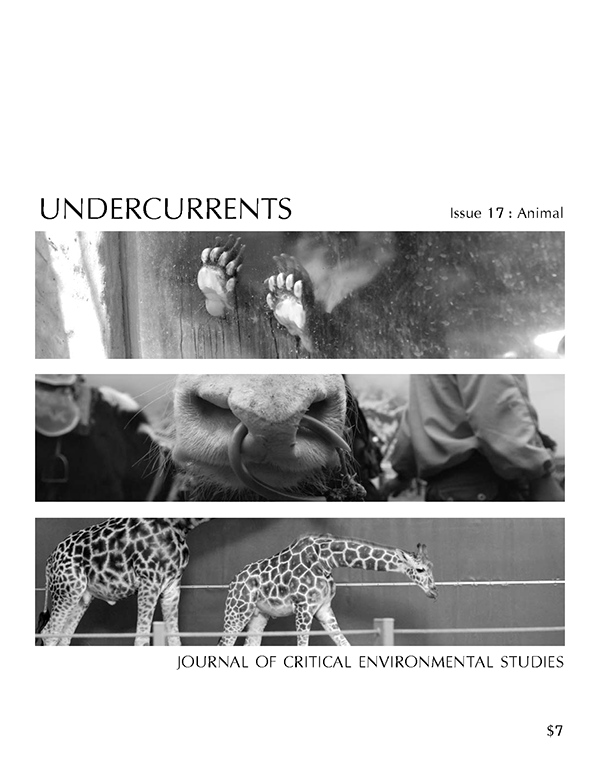Making a Killing, Bob Torres
DOI:
https://doi.org/10.25071/2292-4736/37687Abstract
San Francisco, AK Press, 2007
Full Text
You cannot buy the Revolution.
You cannot make the Revolution.
You can only be the Revolution.
It is in your spirit, or it is nowhere.
-Shevek, in The Dispossessed,
by Ursula K. LeGuin
In a testament to his ability to draw on diverse authors and theories, Bob Torres opens the final chapter of Making a Killing: The Political Economy of Animal Rights with a quote from a science fiction novel, and in so doing he successfully draws together many of the themes of his work. LeGuin's character Shevek hails from a society organized by property-less relationships, complete gender equality and communal living. Shevek travels to the capitalist planet Urras and finds a materially wealthy society plagued by repression, alienation and radical inequality. His revolutionary ideas are quickly shot down. For Torres, Shevek represents a social anarchist perspective that entails a daily commitment to living and embodying the principles that one wants to see practiced in the world.
Far from beginning his academic career as an animal rights activist, Torres, assistant professor of sociology at St Lawrence University and co-host of the popular Vegan Freak Radio podcast, originally studied agricultural science. It was a "dairy production" class that initially led him to think more seriously about animal oppression, and the logistics of the commodification of sentient beings under capitalism. Torres was taught to view animals as producers. He learned how a farmer survives in the "go big or go home" world of agribusiness: by squeezing every last bit of production out of animals for the least possible input. Capitalism relies on alienation between "producers" (in this case, cows) and their "products" (their calves, their milk, and eventually, their own bodies), creating a mental distance between consumers and producers that obscures underlying power relations and exploitation. Torres' experiences with production agriculture disrupted this mental distance by revealing the process by which sentient beings become "living machines" for the profit and enjoyment of humans.
Torres situates his analysis of animal exploitation and advocacy within broader discussions of Marxist political economy, social ecology, social anarchism, and abolitionist animal rights theory. He challenges all of his readers, regardless of their political inclinations and thoughts on the status of nonhuman animals, to make connections between different forms of oppression, and to examine the power relationships that underlie their attitudes and consumer choices. He implores the Left to consider animals within broader liberation struggles but reserves some of his most powerful critique for the "animal rights" movement itself. He chastises animal advocates who fail to work in solidarity with other anti-oppression movements and whose means are inconsistent with their desired ends.
Torres maintains that if capitalism, commodification, and property relations are inextricably linked to animal exploitation, then working from within this paradigm is not a recipe for effective activism. According to Torres, the animal rights movement in its current incarnation as the "Animal Rights Industry" has lost sight of itself and its long-term goals and has been co-opted to the point where it can no longer target exploitation at its foundation. He argues that the movement has become dominated by multi-million dollar organizations with enormous operating budgets that work directly with agribusiness in pursuit of endless welfare reforms. He points to the ongoing "love affair" between animal protection organizations and corporations like Whole Foods, and argues that these alliances actually make animal exploitation more profitable. Despite all of the rhetoric about "compassion", corporations' primary responsibility is towards shareholders. For example, rather than encouraging concerned consumers to stop eating animal products, Whole Foods caters to a niche market willing to pay a premium for "happy meat". Drawing on the abolitionist animal rights theory of Gary Francione, Torres shows how this phenomenon actually perpetuates animal exploitation by reinforcing the idea that animals are property, thereby legitimating their commodification. As the (legal and conceptual) property of humans, animals' subjectivity, their interests in not suffering, and the fulfillment of their natural needs and behaviours all become secondary to the interests of property owners. For these reasons, welfare reforms and anti-cruelty laws inevitably fail to protect the interests of animals.
Having argued that we cannot buy a revolution for animals by donating to our favourite animal protection corporation or by purchasing ever more "humane" animal products, Torres maintains that anyone can use their own strengths and talents to bring about social change - all that is needed is a commitment to making a change consistent with one's own principles. Torres empowers his readers to seek affinity with other social movements and to strive for fundamental societal change that strikes at the roots of all hierarchy and domination. Recognizing animal exploitation as a needless form of domination, Torres advocates veganism as a direct refusal to participate in the consumption, enslavement, and subjugation of animals for human ends. Veganism is a daily, lived expression of that ethical commitment, and it embodies the change that animal rights movement seeks to implement.Published
How to Cite
Issue
Section
License
Copyright (c) 2013 Elizabeth HartnettCreators retain copyright for all writings and artwork published in UnderCurrents. New material published as of Volume 21 (2022) is available under a Creative Commons Attribution 4.0 International License (CC-BY 4.0).


